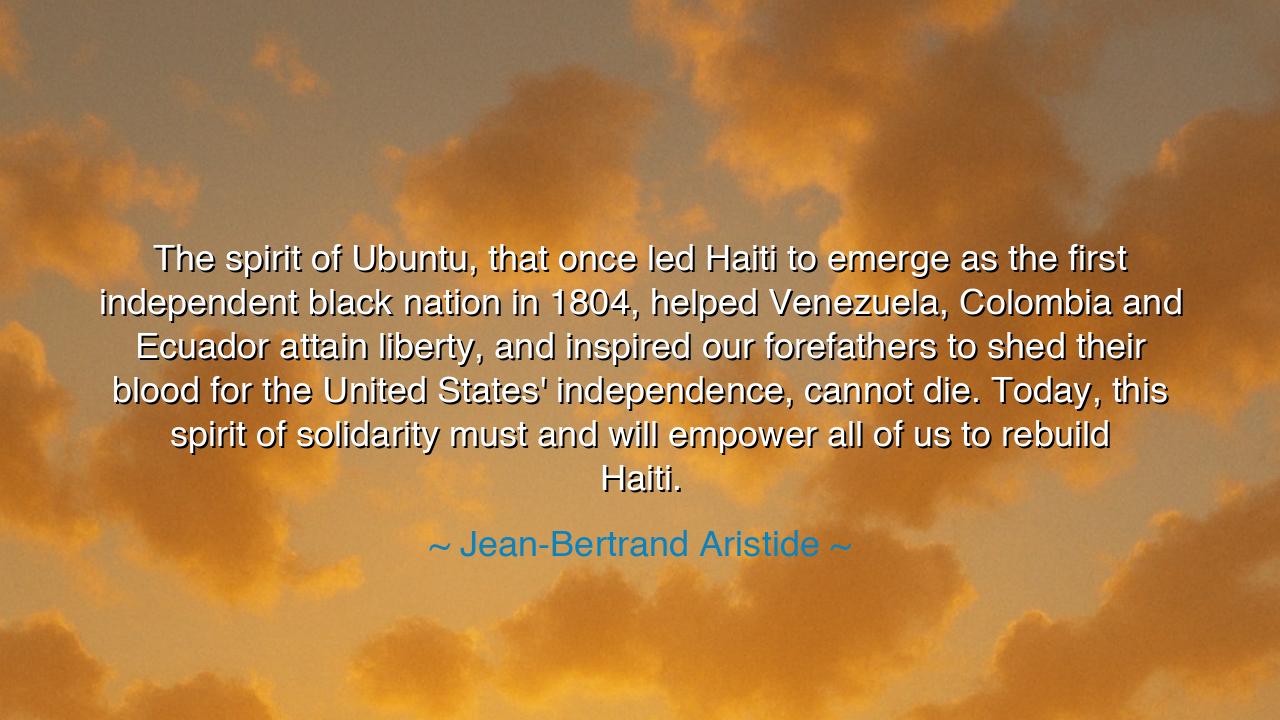
The spirit of Ubuntu, that once led Haiti to emerge as the first
The spirit of Ubuntu, that once led Haiti to emerge as the first independent black nation in 1804, helped Venezuela, Colombia and Ecuador attain liberty, and inspired our forefathers to shed their blood for the United States' independence, cannot die. Today, this spirit of solidarity must and will empower all of us to rebuild Haiti.






The words of Jean-Bertrand Aristide, son of Haiti and servant of her people, flow like a sacred hymn of remembrance and renewal. When he said, “The spirit of Ubuntu, that once led Haiti to emerge as the first independent black nation in 1804, helped Venezuela, Colombia, and Ecuador attain liberty, and inspired our forefathers to shed their blood for the United States’ independence, cannot die. Today, this spirit of solidarity must and will empower all of us to rebuild Haiti,” he was not merely speaking of history—he was summoning the living soul of humanity. His words carry the weight of centuries and the fire of resistance; they remind us that the struggle for freedom is not an isolated act, but a shared human covenant that binds all people across time and land.
To understand his message, we must begin with the word Ubuntu, a concept born in the heart of Africa, carried through the centuries by those whose ancestors endured enslavement and exile. Ubuntu means “I am because we are.” It is the belief that our humanity is woven together—that one’s freedom, dignity, and survival are inseparable from another’s. In invoking this spirit, Aristide draws a golden thread that connects Africa to Haiti, Haiti to the Americas, and the Americas to the world. He reminds us that the same spirit that broke the chains of empire still lives within us, waiting to be rekindled whenever the world grows cold or divided.
Haiti’s independence in 1804 was not merely the birth of a nation—it was the resurrection of human dignity itself. Enslaved men and women, led by the indomitable Toussaint Louverture and later Jean-Jacques Dessalines, rose against one of the greatest powers of their age and triumphed. It was the first time in recorded history that enslaved people had overthrown their oppressors and built a free republic. Haiti’s victory sent tremors through every empire built on bondage; it was a beacon to all who longed for liberty. And, as Aristide reminds us, Haiti did not guard its light jealously—it shared it. Haitian soldiers fought alongside Simón Bolívar, offering arms and aid that helped bring freedom to Venezuela, Colombia, and Ecuador. The flame of Ubuntu—the shared belief in the liberation of all humanity—passed from island to continent, from heart to heart.
And yet, Aristide also speaks from a place of deep sorrow. Haiti, the mother of black freedom, has long been made to suffer for her defiance. From her earliest days, she was punished by isolation, her revolution treated as a contagion. Foreign powers crushed her economy, exploited her resources, and manipulated her politics. Even in modern times, Haiti has faced disasters both natural and manmade. But Aristide’s words rise as defiance against despair. He declares that the spirit of solidarity, the spirit of Ubuntu, cannot die—not while there are still hearts willing to act in compassion, and hands willing to build. The power that once broke chains can also mend ruins.
In the tone of the ancients, we may say: the spirit of Ubuntu is the breath of the ancestors. It is the voice that whispers across generations: “None are free until all are free.” It is the same voice that stirred the slaves of Saint-Domingue to rebellion, the colonists of America to revolution, the liberators of South America to courage. This is what Aristide calls us to remember—that independence is not a solitary possession, but a sacred trust. Every generation inherits the duty to keep this spirit alive—to protect one another, to lift one another, to rebuild when the storms of fate strike down what is dear.
Consider, for example, the earthquake that shattered Haiti in 2010. Amid the rubble, amid despair, the world turned its eyes once more to that small island that had once defied empires. Nations came together—neighbors helping neighbors, strangers reaching out with compassion. Doctors, soldiers, and volunteers crossed seas and borders to bring relief. In those moments, the world, perhaps unknowingly, was living Ubuntu—realizing that humanity’s wounds can only be healed through unity. Aristide’s words are a call to keep that unity burning, not as charity, but as kinship—the recognition that in lifting others, we lift ourselves.
The lesson, then, is this: solidarity is the heartbeat of civilization. Independence without compassion is hollow; freedom without fellowship is fragile. True strength lies not in isolation, but in interdependence—the courage to see oneself in the face of another. The spirit of Ubuntu that liberated nations and toppled tyrannies still waits to be summoned in our time, not only for Haiti, but for every place where suffering still dwells and hope falters.
And so, the practical path is clear: live as though your neighbor’s fate is your own. Share what you have, not out of pity, but out of shared humanity. When you see injustice, speak; when you see despair, act. Rebuild not only with stone and timber, but with mercy, faith, and cooperation. For as Jean-Bertrand Aristide teaches, the spirit that once gave birth to freedom cannot die—it merely waits to be remembered, and in that remembrance, the world may yet rise anew.






AAdministratorAdministrator
Welcome, honored guests. Please leave a comment, we will respond soon